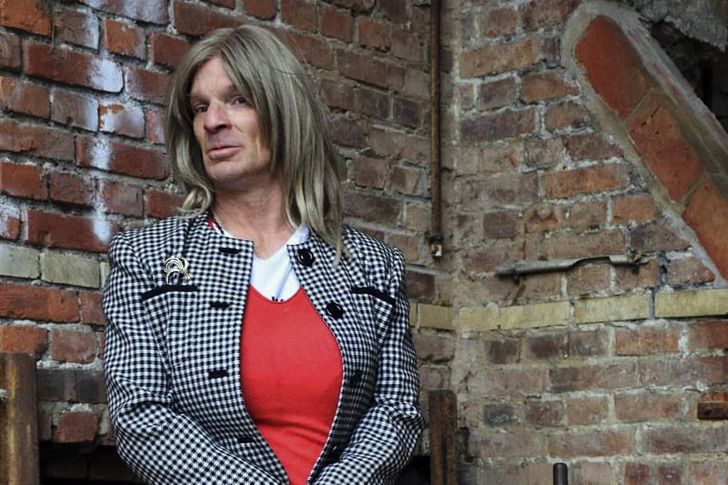The protagonist of the following story is Petra, a trans person who changed from a man to a woman, and the other characters are an evil Hungarian employer, his even more evil employees - representing the Hungarian people -, an NGO always ready for action, and a regulated ombudsman.
Háttér Társaság, our country's largest NGO fighting for LGBT rights, with Hungarian supporters such as the US State Department, the Open Society Foundations and Planned Parenthood behind it, informed us about its latest success last week. They achieved, namely, that the ombudsman abolishes the illegal situation for the woman named Petra, so in her decision
"obliged the employer to somehow provide the transgender employee with the use of changing rooms and restrooms that take into account their gender identity".
Because Petra, after figuring out that she wanted to live as a woman and not as a man, and to that end had medical procedures performed on her, asked her employer to let her use the women's section. However, the employer refused this, and after ordering an in-house referendum, where the vast majority of employees also refused, did not change his original position. This method is called democratic procedure in backward places. However, it is precisely in the backward places that progress feels the need to lift useless peoples out of their self-imposed darkness to the greater glory of a bright future.
I don't know if it occurred to the militant rights defenders that in the midst of their great zeal they once again resulted in a perfectly lose-lose situation? Of course, it's not the first time, the same thing happened in Gyöngyöspata, for example, nobody won. The afterlife is rarely processed, although I doubt that the amount won by the gypsies, ranging from a few hundred thousand to one or two million forints per person, did not immediately burn in their hands, but brought a lasting, positive change in their lives. But the municipality and the Hungarian state also lost, around one hundred million, but most of it was lost by the taxpayers and honest members of the local community, and with them the entire Hungarian society, which was deeply humiliated. I also quietly note that segregation could be abolished in one way, and only in this way - by force, by no means - if and as long as the minority would make integration attractive to the majority.
But returning to Petra's case: it probably doesn't even occur to the rights defenders, while they are celebrating their supposed success, that the official decree did not say that the trans woman can then dress and pee with real women, but instead obliged the employer to provide her with a restroom that matches her new identity - use. I don't know if Petra will be happy if her workplace will have men's toilets, women's toilets, and a Toi Toi with a separate entrance, just for her, but the employer doesn't mind that she has to deal with such things. They can look forward to a good atmosphere.
And here is the majority, the God-given people, in our case the company's employees, whose respect, trust and love Petra has obviously earned with this move, which she so longed for. Or not. Perhaps he would have gone further with the female colleagues with nice words than with a manly demonstration of strength, of course, who am I to point out the advantages of the peaceful way?
However, there is something else here. Háttér Társaság puts it this way in its statement last week:
"The majority of the staff (including many new staff who didn't really know Petra) voted it down, so the employer once again felt empowered to refuse the use of the women's changing room and washroom."
This sentence raises several problems and cries out for legal aid here and there; would it be worth contacting TASZ in the matter? After all, in a battle like this, every slap would go well.
This statement by Háttér Társaság suggests that the new employees were not actually entitled to vote because they "didn't really know Petra" yet. According to them, the new employee is not entitled to the same employee rights as the old one? Or do your rights increase if you know a local trans woman? But the Háttér Társaság also claims that the new people voted Petra down because they didn't know her, but it doesn't say why the old people did? Maybe because they knew him? It is written about the employer that he felt empowered after learning the position of the majority. Your mess! But what was the expectation, how should he have felt and what should he have done? He would have said, to hell with the math, everyone should hug Petra, but right away?
Finally, it is also worth taking a look at Dr. Ákos Kozma, who was elected by the Parliament in 2019 as Commissioner for Fundamental Rights for six years. His personality is particularly exciting because "civilian" human rights organizations cannot stand it, so he must be doing something right.
In June of this year, the work of Kozma and his office was investigated by the World Federation of Ombudsmen (the Subcommittee consisting of four national human rights institutions with "A" status) and found that the status of the Hungarian Commissioner for Fundamental Rights should be downgraded to "B" because he did not adequately deal with a number of problems , including violations affecting vulnerable ethnic minorities, LGBTI people, refugees and migrants; with media pluralism; with the situation of civil organizations; with the independence of the courts; and did not turn to the Constitutional Court in certain politically sensitive issues, as well as in cases involving legal protection institutions.
In its August 4 article, HVG writes about the demotion of our ombudsman:
"The Hungarian Helsinki Committee, reporting on the decision, recalled that in February this year, with the help of Amnesty International Hungary, the Eötvös Károly Institute, the Háttér Társaság and the Society for Freedoms, they analyzed the activities of the new ombudsman in a shadow report, during which it was revealed that he specifically avoids being confronted to side with the government on politically sensitive matters and does not or does not act adequately to protect the groups affected by them. The Subcommittee would have previously decided on the status in October 2019, and even then they saw that the outgoing commissioner, László Székely, did not make adequate efforts to address all human rights issues, but the decision was postponed to give Ákos Kozma, who was taking office at the time, time to correct. The final decision on the downgrading can be made at the meeting of the Subcommittee next year, which means that Ákos Kozma will be given additional time to prove himself."
And then let's emphasize the last sentence, then turn it around and taste it:
"The final decision on the downgrading can be made at the meeting of the Subcommittee next year, which means that Ákos Kozma will have additional time to prove himself."
The commissioner of fundamental rights, who runs an independent institution democratically elected by the Hungarian parliament, is given a reprieve based on the reports of foreign-supported NGOs, who were not elected by anyone, to finally start behaving "properly".
I don't know if the ombudsman's decision in Petra's case is sufficient evidence of the expected behavior, but if Hungarian society is forced again and again to impose great injustices with small truths on it, then we are facing an extraordinarily adventurous future.
Featured Image: Illustration / Facebook. The picture shows Eefje Spreuters, a Belgian transwoman
who wants to be a nun.













